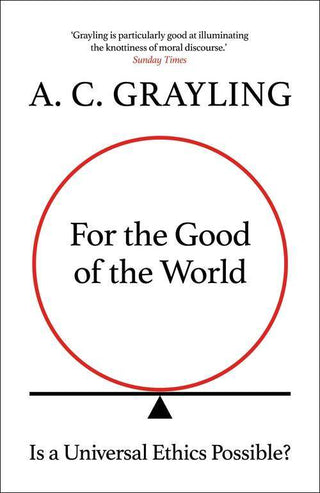For the Good of the World : Is Global Agreement on Global Challenges Possible?
- Unit price
- / per
-
Author:GRAYLING A C
-
ISBN:9780861542666
-
Publication Date:February 2022
-
Edition:1
-
Pages:256
-
Binding:Hardback
-
Publisher:Te Herenga Waka University Press
-
Country of Publication:


A Back Order button means that we don’t have the book in stock at our store. It may already be on order – or we can order it for you from a publisher or distributor at no additional cost.
As we source items from around the globe, a back-order can take anywhere from 5 days to several weeks to arrive, depending on the title.
To check how long this might take, you’re welcome to contact us and we can provide an ETA or any other information you need. We recommend checking the timeframe before committing to an online order.
For the Good of the World : Is Global Agreement on Global Challenges Possible?
- Unit price
- / per
-
Author:GRAYLING A C
-
ISBN:9780861542666
-
Publication Date:February 2022
-
Edition:1
-
Pages:256
-
Binding:Hardback
-
Publisher:Te Herenga Waka University Press
-
Country of Publication:
Description
Can we human beings agree on a set of values which will allow us to confront the numerous threats that we and our planet face? Or will we continue our disagreements, rivalries and antipathies, even as we collectively approach what, in the not impossible extreme, might be extinction?
To answer these questions, A. C. Grayling considers the three most pressing challenges facing the world- climate change, technology and justice, acknowledging that there is no worldwide set of values that can be invoked to underwrite agreements about what to do and not do in the interests of humanity and the planet in all these respects.
If there is to be a chance of finding ways to generate universal agreement on how the world's various problems are to be confronted at least managed, if not solved the underlying question of values (together with the problem of relativism) has to be addressed. One part of the answer may lie in toleration and convivencia the basis of coexistence among Muslims, Jews and Christians in the Iberian peninsula between the ninth and fifteenth centuries CE.
Adding product to your cart
You may also like
A Back Order button means that we don’t have the book in stock at our store. It may already be on order – or we can order it for you from a publisher or distributor at no additional cost.
As we source items from around the globe, a back-order can take anywhere from 5 days to several weeks to arrive, depending on the title.
To check how long this might take, you’re welcome to contact us and we can provide an ETA or any other information you need. We recommend checking the timeframe before committing to an online order.
You may also like
You may also like
-
Can we human beings agree on a set of values which will allow us to confront the numerous threats that we and our planet face? Or will we continue our disagreements, rivalries and antipathies, even as we collectively approach what, in the not impossible extreme, might be extinction?
To answer these questions, A. C. Grayling considers the three most pressing challenges facing the world- climate change, technology and justice, acknowledging that there is no worldwide set of values that can be invoked to underwrite agreements about what to do and not do in the interests of humanity and the planet in all these respects.
If there is to be a chance of finding ways to generate universal agreement on how the world's various problems are to be confronted at least managed, if not solved the underlying question of values (together with the problem of relativism) has to be addressed. One part of the answer may lie in toleration and convivencia the basis of coexistence among Muslims, Jews and Christians in the Iberian peninsula between the ninth and fifteenth centuries CE.
-
-
Author: GRAYLING A CISBN: 9780861542666Publication Date: February 2022Edition: 1Pages: 256Binding: HardbackPublisher: Te Herenga Waka University PressCountry of Publication:
Can we human beings agree on a set of values which will allow us to confront the numerous threats that we and our planet face? Or will we continue our disagreements, rivalries and antipathies, even as we collectively approach what, in the not impossible extreme, might be extinction?
To answer these questions, A. C. Grayling considers the three most pressing challenges facing the world- climate change, technology and justice, acknowledging that there is no worldwide set of values that can be invoked to underwrite agreements about what to do and not do in the interests of humanity and the planet in all these respects.
If there is to be a chance of finding ways to generate universal agreement on how the world's various problems are to be confronted at least managed, if not solved the underlying question of values (together with the problem of relativism) has to be addressed. One part of the answer may lie in toleration and convivencia the basis of coexistence among Muslims, Jews and Christians in the Iberian peninsula between the ninth and fifteenth centuries CE.
-
Author: GRAYLING A CISBN: 9780861542666Publication Date: February 2022Edition: 1Pages: 256Binding: HardbackPublisher: Te Herenga Waka University PressCountry of Publication:
-



